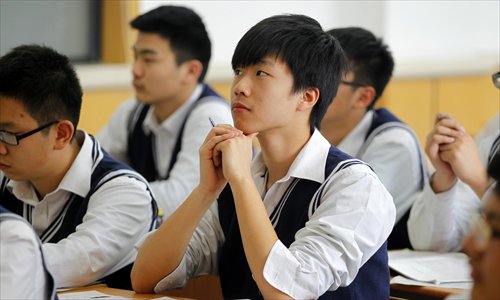Learning to be boys

Students at a Shanghai No.8 Senior High School's boys-only class take a Chinese lesson. Photo: Cai Xianmin/GT
When Lu Qisheng, the headmaster of the Shanghai No.8 Senior High School, helped introduce the city's first-ever all-boys school program in the fall of 2012, he was unsure how the experiment would turn out.
The program, which saw the school introduce two single-sex classes for 64 young male students, was intended to narrow the growing performance gap between Chinese girls and boys, a problem some blame on the so-called masculinity crisis among today's Chinese youths.
Before it officially began, the pilot program triggered heated discussion and controversy as the public debated the necessity and effectiveness of the scheme. While many felt the program was a bold trial of educational reform, others decried it as gender discrimination.
Much to Lu's relief, research initiated by the school has shown that the single-sex classes have proved to be effective and have improved these students' all-round performances.
Behavior recorded
"We have been conducting a series of scientific studies on a bimonthly basis since the pilot program kicked off more than 18 months ago. Using video recorders, we recorded and studied the students' classroom behavior and performance. After examining a great deal of data, we summarized some of reactions and attitudes of the boys, and, based on these observations, we adjusted our teaching methods to appeal more to the male psyche," Lu Qisheng told the Global Times.
Lu said the recent study showed that the program's first batch of recruits, who are now in their second year of high school, have not only academically outperformed their peers in coeducational classes, but have also developed physically and psychologically.
Although most of the syllabus for the boys-only classes remained the same as in other city high schools, a special curriculum targeting male personalities was adopted to help the students reach their full potential.
"The school offers a string of special courses every semester designed to broaden the scope of the boys' knowledge, to cultivate their interpersonal skills, to hone their ability to think logically and express themselves, and to develop self-discipline and determination. And after long-term observation and careful study, we have also adopted a variety of different teaching styles and methods including lab experiments, open classroom discussions and brainstorming sessions that the boys have responded well to," Lu noted.
As well as the special curriculum, the boys can also choose from a range of extracurricular activities which emphasize practical, hands-on skills and physical training, Lu said.
Dai Zhongqin and Xu Ying, two Grade 11 students who are in the pilot program, are enthusiastic about the extracurricular activities. "I wasn't really good at sport when I was in the junior high school. But I have become keen on athletics and, after running every morning for some time, I'm quite good at this now," said Dai, a tall thin boy who recently came first in the school's 1,000 meters race.
Principal Lu said that all the boys in the pilot scheme have to run 1,000 meters every morning. "And I've also learned to master other technical skills from courses and extracurricular activities," Dai said. He is now a capable hand at computer programming, carpentry, electro-engineering and wilderness survival skills.
"I've been losing weight and staying fit thanks to the morning running sessions and other physical exercises. And I think I am more self-motivated about studying," Xu Ying told the Global Times.
He said that even though there were no girls in the class he felt he and his classmates could develop communication and interpersonal skills by talking to their female teachers. One of the best things about the scheme, Xu said, was the mutual understanding and respect the boys now have for each other.
"Although we often have different ideas and opinions about our lessons or other topics, we always listen to each other and show respect even if we can't agree. There are never any fights or brawling in our classrooms," Xu said proudly.
His sentiments were echoed by his class monitor, Qin Jiajie. "The best thing about being in this single-sex class is the team spirit - everyone gets along with each other and sticks together. I have close friendships with several classmates. We've all managed to have some fun - even without girls," Qin told the Global Times.

The school crest and gates of the Shanghai No.8 Senior High School Photos: Cai Xianmin/GT

The school crest and gates of the Shanghai No.8 Senior High School Photos: Cai Xianmin/GT
Odd feelings
Although Qin, like most of his classmates, enjoys his studies and life, he admitted to odd feelings when he first started his high school studies in a boys-only class. "It was so different from my middle school days. It felt strange and a novelty at the beginning, but I quickly got used to it," Qin said.
When asked whether it was his personal choice or his parents' decision to join the program, the quick-witted student grinned, and said he had been asked this several times. "Yes. I did apply to join this by myself though I had no idea what was involved. But it's turned out to be a good choice."
Bian Hui, a Chinese teacher who has been teaching one of the school's boys-only classes since the launch of the program in 2012, speaks highly of her students.
"Compared with their peers in the school's coeducational classes, these students are thinking better and communicate more effectively. They are outgoing, expressive and enthusiastic, and tend to develop a better rapport with their teachers. They have a stronger drive to learn and ask more questions, even challenging their teachers sometimes," Bian said.
While Bian praises some of the achievements of her boy students, she has also met challenges in handling occasionally adrenaline-charged adolescents. "It's harder for a teacher to control a boys-only classroom, harder to keep them quiet and focused on lessons while encouraging them to interact at the same time - it requires a lot of effort and skill."
Bian and her colleagues have adopted different teaching styles to suit the new classroom format. "For example, I have a brief reading session at the beginning of every Chinese class in an attempt to get the boys' attention and keep them concentrated," she explained.
More appealing
To make Chinese lessons more appealing to male students, Bian regularly takes her boys to city libraries for extended reading sessions. After they read she asks them to write down their thoughts and opinions and share these in discussions later.
Bian believes most of her boys have improved all-round, and the headmaster Lu Qisheng agrees.
"For me, these boys have been undergoing a series of positive changes, both mentally and physically. They have grown stronger and healthier. They have also become more reliable, sensible and capable. They have also learned to control tempers, make plans and stick to them. These are good qualities and will help them aim higher and achieve more in the future," Lu said.
The three Grade 11 students, Dai Zhongqin, Xu Ying and Qin Jiajie, who talked to the Global Times, were all ambitious about their studies and career prospects. Both Dai and Qin are working to secure places at Fudan University, the city's most prestigious institution, while Xu is aiming for the renowned East China Normal University in the hope of becoming a teacher so that he can one day return to his alma mater and teach new classes of boys. Most of their classmates are aiming for top-ranking universities in Shanghai.
While principal Lu said the current performance of the boys-only classes had succeeded beyond most people's expectations he was conservative about the future of the pilot scheme.
"Although our study results and the boys' performances have proved the viability of the single-sex school program, we don't have any intention to enroll any more students than we have at present for the upcoming fall semester," Lu said.
He said the school now has two Grade 11 classes with more than 60 boy students, and four Grade 10 classes of about 120. He didn't rule out the possibility of turning the 153-year-old high school into an all-boys affair in the future. "The school's transformation depends on lots of factors. We will wait and see how things turn out," Lu said.
Worthwhile attempt
Xiong Bingqi, an education expert and the vice president of the 21st Century Education Research Institute, believes the Shanghai No.8 Senior High School's all-boys pilot program is a worthwhile attempt to diversify the city's current education demographics. "The scheme breaks the current domination of coeducational classes and shows the possibility and feasibility of diversified education modes and teaching methods," Xiong told the Global Times.
However, he said the scheme would only be a meaningless gesture if there were no radical reforms to the current gaokao (national college entrance examinations) system.
"Given the fact that all students in China still need to sit the gaokao in which only scores matter in the end, there is little point running trial programs in the name of reform. The true and core value of education can never be allied with a grading system," Xiong said.